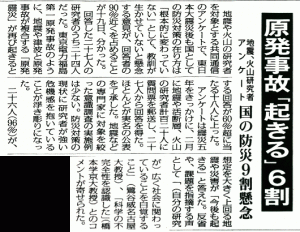Original Japanese written by staffer
The English below written and arranged by Heeday, based on the original Japanese
The English edited by Rev. Dr. Henry French, ELCA
Below: Article from the March 20th, 2016 edition of the Fukushima Minpo newspaper
Experts’ opinion
Kyodo News conducted a survey with researchers in the fields of seismology and volcanology, and they discovered that almost 90% of the respondents thought Japan’s national disaster countermeasures “have not changed substantially” since the March 2011 earthquake. According to those respondents, the nation has yet to learn the lessons from the 2011 devastations.
More than 60% say it can happen again
Taking advantage of this fifth annual commemoration of the East Japan Earthquake, the questionnaire was sent to 120 researchers in the areas of seismology, active faults, and/or volcanology. Only 27 researchers responded. More than 60% of the respondents (18) said that we could have another “nuclear-earthquake complex disaster,” which is to say that a devastative complex disaster including an earthquake, tsunami, and a nuclear reactor accident could happen again someday. Also, 26 of the respondents (96%) replied that an earthquake or another disaster that far exceeds our assumptions “will happen again someday.” Some of the respondent admitted that researchers can make wrong judgments. Some respondents thought that researchers should be more involved in the general society.
The Japanese author’s concerns
Another thing worrying me about this survey is the low response rate—only 20%. The remaining 80% who received the survey did not respond—why? These researchers are expected to make scientific contributions to disaster prevention. If they avoid commenting on issues related to nuclear power, it is a serious problem.
Many people most likely think of the tragedies of Chernobyl and Fukushima Daiichi when they hear about “nuclear power plant accidents.” The plain fact, however, is that globally many such accidents have taken place so far, and Japan is no exception. In September 1999, at JCO’s nuclear fuel plant in Tokai Village, Ibaraki (some 60 miles NE of central Tokyo), a “criticality accident,” something theoretically impossible, did happen and killed two employees. In August 2004, the secondary piping fractured—an accident that could have been easily prevented—at Unit 3 of Kansai Electric Power’s Mihama Nuclear Power Plant (NPP), killing five subcontract workers. Moreover, criticality incidents have hit the Shika NPP and Fukushima Daiichi in the past, yet were covered up. Thus, NPP accidents are actually quite frequent. This is a plain fact that citizens should be well aware of.
